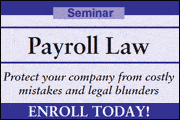Payroll Law Seminar Agenda

Seminar: ID# 1003650

Agenda
A day that brings clarity to your payroll gray areas
Part 1
Payroll Management: Beginning With the End in Mind
What you don't know can hurt you. That's never more true than when dealing with payroll law. The first step to complying with regulations is understanding them. You'll begin your class with a crash course in payroll's legal basics. Find out what the state, federal and joint regulators are looking for and learn how to avoid the often-staggering penalties and fines of non-compliance. This segment alone is worth the seminar’s tuition.
- Why payroll administration is not just about the numbers
- The high cost of improperly classifying employees
- The QETP (Questionable Employee Tax Practices)
- The top three questions auditors and investigators will ask — and why
- Establishing good faith efforts that reduce penalties and fines
- Five vital internal audits that are not about the math
- What to do if you get an FLSA complaint
Part 2
Making Sense of the FLSA Overtime Exemptions
There’s a lot of meat to the Fair Labor Standards Act and regulators are watching closely. It takes careful maneuvering to stay out of legal hot water. The most innocent mistake can result in a substantial fine and you losing credibility with your company. Be prepared by knowing what’s expected and how to comply.
- Exempt vs non-exempt employees — What’s the difference?
- Three tests to help determine overtime exemptions — salary, highly compensated and standard duties
- Types of exemptions: Executive, Professional, Administrative, Outside Sales and Computer Professionals
- Understanding the overtime-exempt payment and docking rules
Part 3
Worker Classification: Employee or Independent Contractor — How to Decide?
The DOL and IRS have joined together in an initiative to end the practice of misclassifying employees as independent workers or contractors. In some states this is a criminal offense and can carry very high monetary penalties and possibly even jail time. But, a worker does not need to qualify for a 1099-MISC to be an "Independent." In this section of our day, you will learn how to spot the Red Flags you may not have previously recognized.
- Creating a worker classification process
- W-9 Compliance
- What is back-up withholding and when should you use it?
- 1099-MISC Hot Tips
- Auditing your W-4 process
- E-verify and New-Hire Reporting
- Your payroll department and the I-9 44
Part 4
Payroll and the Non-exempt Employee
Handling payroll sounds like a simple proposition. Employees work at a certain rate of pay. You take out taxes and give them the rest of what they’ve earned. If only it were that clear-cut. Regulations regarding what constitutes hours worked and pay for off the clock time can turn a simple proposition into a legal land mine. Armed with the strategies you’ll gain at this seminar, you’ll handle payroll accurately, legally and with complete confidence.
- Paid and unpaid leave policies that payroll must understand
- Recognizing compensable time
- Rounding and adjusting the timeclock: The Rule of De Minimis Time
- Overtime requirements and options employers should consider
- Spotting and correcting wage and hour violations
- Gone to the Guard for the week — what to do when military pay and your payroll overlap
- Tips and uniform allowances — what's considered income, what's not?
- What you're required to pay when an employee is dismissed
Part 5
Special Payroll Considerations and Hot Tips for Maintaining Compliance
Every employee’s paycheck presents a different challenge. After the seminar you’ll know which forms to use when and, most importantly, how to keep your company out of hot water with the DOL and state agencies. It’s their job to catch you in a mistake. Together, we’ll make sure that doesn’t happen.
- How to determine the order of multiple garnishments for an employee
- When and how to tax fringe benefits
- The legal ramifications of paycheck advances
- Compensation and fair market value — what the law says you must do
- Gifts that must be reported to the IRS
- Withholding and reporting rules for cash fringe benefits vs. non-cash fringe benefits
- Cell phone supplements — taxable or not?